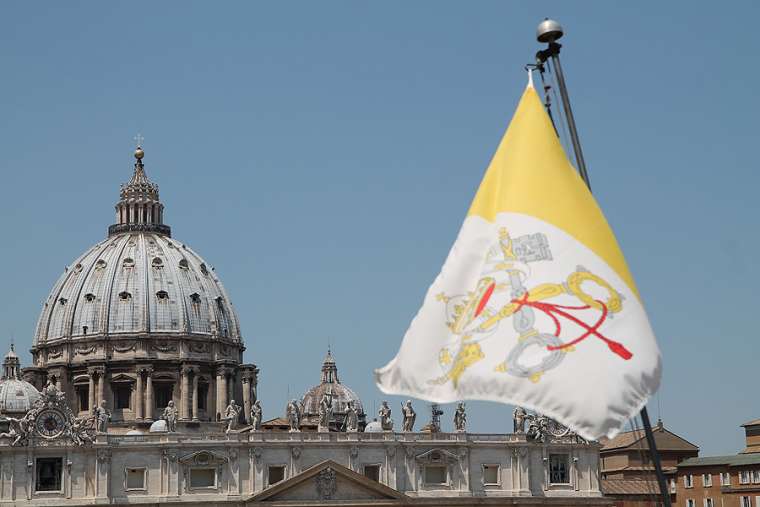The flag of Vatican City with St. Peter’s Basilica in the background. Credit: Bohumil Petrik/CNA.
The Vatican unveiled changes to a landmark law on transparency, supervision, and financial intelligence yesterday, saying that the move would strengthen oversight of financial flows.
The Holy See press office published the text of a decree 10 October by Cardinal Giuseppe Bertello, president of the Governorate of Vatican City State, amending the 2013 law.
The changes came amid a two-week on-site inspection of the Holy See and Vatican City by Moneyval, the Council of Europe’s anti-money laundering watchdog.
There has been a flurry of activity since the inspection began, with the Vatican’s Secretariat for the Economy releasing the 2019 balance sheet for the Roman Curia Oct. 1, the day after inspectors arrived.
The new 15-page decree alters Law XVIII, dated 8 October 2013, which set out provisions to combat money laundering and the financing of terrorism.
Carmelo Barbagallo, president of the Vatican’s Financial Information Authority (AIF), said that the changes updated the 2013 law to reflect evolving international standards.
“The latest amendments to Law XVIII are part of an overall strategy aimed at making the management of Vatican finances ever more transparent, within a framework of intensive and coordinated controls,” he said.
Barbagallo said the amendments were the latest development in a process that began with the creation of the AIF in 2010 and included the promulgation of a law on the awarding of public contracts on June 1 this year, as well as an Aug. 19 ordinance requiring “volunteer organizations and juridical persons of Vatican City State” to report suspicious activities to the AIF.
He explained that the new provisions sought to tighten regulation of financial flows within the Vatican.
He said: “For my part, I am convinced that the changes made to this Law, as well as all the regulations enacted in these past few years, will be able to demonstrate, both internally and to external observers, the firm commitment on a matter on which the Church takes an irreversible position.”
Meanwhile, the composition of the Cardinals’ Commission of the Institute for Works of Religion (IOR), commonly known as the Vatican bank, has changed. Cardinal Pietro Parolin, the Vatican Secretary of State, is no longer a member of the commission.
The body is now composed of five cardinals: Cardinal Santos Abril y Castelló, the commission’s president; Christoph Schönborn of Vienna; Cardinal Giuseppe Petrocchi of L’Aquila; Cardinal Konrad Krajewski, papal almoner; and Cardinal Luis Antonio Tagle, prefect of the Congregation for the Evangelization of Peoples.
Petrocchi, Krajewski, and Tagle are new to the commission. They replace Parolin, Cardinal Thomas Collins of Toronto, and Cardinal Josip Bozanić of Zagreb.
The cardinals’ commission convenes at least bi-annually and oversees the IOR’s compliance with its statutory norms, according to the manner provided for in its by-laws.
Source: CNA

